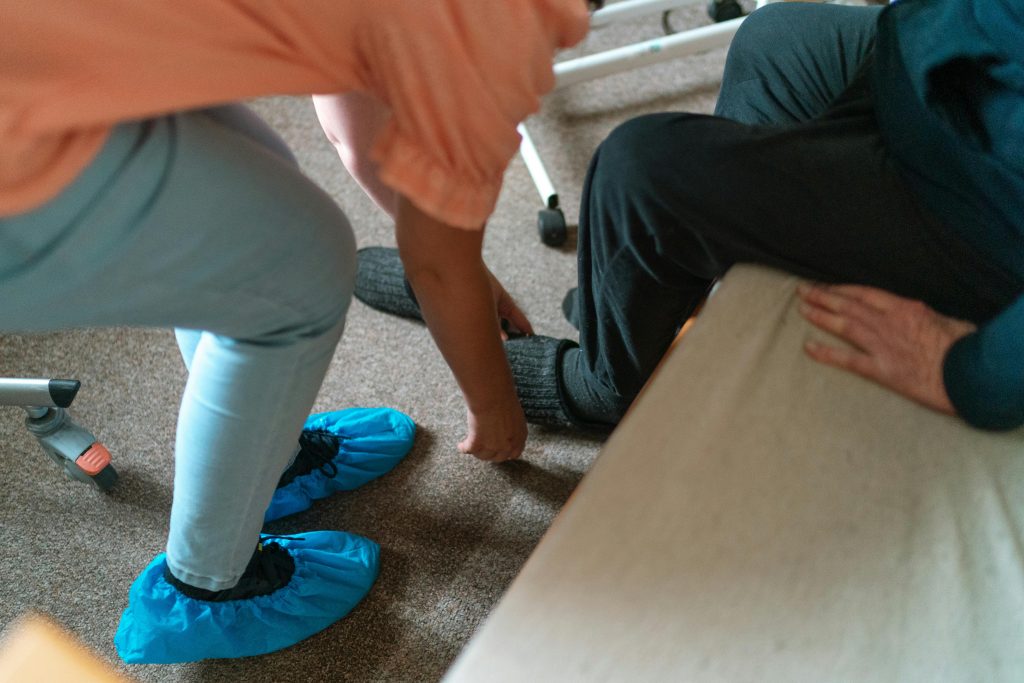Personal Care
Being unwell or not being able to take care of yourself does not mean you need to look the part. Whether you need a little nudge, some motivation or physical assistance to help you look and feel your best despite your circumstances – We will get the job done with the respect, dignity everyone deserves. No awkwardness – we promise. We believe, you’ll feel better when you also look the part…
Bathing and Grooming
- Assisting with bathing or showering
- Helping with hair care, shaving, and oral hygiene
Dressing
- Assisting with choosing appropriate clothing
- Helping with dressing and undressing
Toileting and Incontinence Care
- Assisting with bathroom visits
- Providing incontinence care and support
Mobility Support
- Helping with walking and transferring
- Assisting with the use of mobility aids
Eating and Drinking
- Assisting with meal setup and feeding
- Monitoring fluid intake
Assisting with personal care as and when needed...

Life is worth living to the last breath...
We are committed to providing a sense of stability and continuity when life brings unexpected challenges. At Gallantry, our team is dedicated to helping you or your loved ones maintain a fulfilling lifestyle that suits their needs, despite the difficulties that come with aging or illness. Afterall, you can still aim for the stars even in the confinements of your home.
Benefits of Personalized Home Care:
Maintaining Independence
- Promotes Sovereignty: Our Home care services allow individuals to remain in the comfort and familiarity of their own homes, fostering a sense of independence and control over their lives.
- Assistance with daily tasks: Care workers help with activities of daily living (ADLs) such as bathing, dressing, grooming, and meal preparation, enabling individuals to maintain their personal hygiene and routines while still living independently.
2. Personalized Care
- Tailored support: Home care services are customized to meet the specific needs of each individual, whether they require help with mobility, medication management, or specialized care for chronic conditions.
- One-on-one attention: Care workers provide dedicated, individualized care that is often difficult to achieve in institutional settings like hospitals or nursing homes, ensuring the individual’s needs are consistently met.
3. Improved Quality of Life
- Comfort and dignity: Receiving care in one’s home preserves dignity and comfort, helping individuals maintain a sense of normalcy and self-esteem, which is essential for emotional well-being.
- Companionship: Care workers not only provide physical assistance but also emotional support and companionship, reducing loneliness and isolation, which is particularly important for the elderly or those who live alone.
4. Faster Recovery and Better Health Outcomes
- Familiar environment: Studies show that individuals often recover more quickly and effectively in their own homes compared to institutional settings due to the familiar and comfortable environment.
- Infection control: Home care reduces the risk of exposure to infections, such as those found in hospitals or long-term care facilities, promoting better overall health and preventing complications.
5. Chronic Disease Management
- Ongoing monitoring: Care workers help manage chronic illnesses by monitoring vital signs, administering medication, and ensuring adherence to treatment plans. This close supervision helps prevent health complications and hospital readmissions.
- Diet and lifestyle management: Care workers assist with dietary planning and exercise routines, helping individuals with conditions like diabetes, hypertension, or heart disease manage their health more effectively.
6. Support for Family Caregivers
- Relief for family: Home care workers provide much-needed respite for family members who may be primary caregivers, alleviating caregiver burnout and reducing the emotional and physical strain on families.
- Peace of mind: Families can have peace of mind knowing that their loved ones are receiving professional care and attention, even when they are not present.
7. Enhanced Safety and Prevention of Accidents
- Fall prevention: Elderly or incapacitated individuals are at higher risk of falls and accidents. Care workers ensure the home is free of hazards and provide assistance with mobility, reducing the risk of injury.
- Emergency readiness: Care workers are trained to respond quickly to emergencies or sudden changes in health conditions, ensuring timely intervention and preventing serious complications.
8. Emotional and Psychological Support
- Mental well-being: Care workers offer emotional support to help manage feelings of depression, anxiety, or isolation, which can often accompany illness or aging.
- Cognitive stimulation: For individuals with dementia or cognitive decline, care workers engage them in mentally stimulating activities, slowing cognitive decline and improving quality of life.
9. Cost-Effective Care
- Affordable alternative: Home care is often more affordable than long-term institutional care in nursing homes or assisted living facilities, making it a cost-effective option for many families.
- Preventing hospitalizations: Regular personal care at home can help prevent hospitalizations by managing chronic conditions effectively and avoiding medical emergencies, reducing overall healthcare costs.
10. Preservation of Dignity and Privacy
- Respect for privacy: Receiving personal care at home ensures that individuals maintain their privacy and are treated with dignity in familiar, comfortable surroundings, which can be difficult to achieve in institutional settings.
- Comfort and familiarity: Being at home allows individuals to remain in an environment where they are comfortable, surrounded by their belongings, family, and memories, enhancing emotional security.
In summary, home personal care provided by a care worker is essential for promoting independence, ensuring safety, managing chronic conditions, and enhancing the overall quality of life for elderly, sick, or incapacitated individuals. It provides a holistic approach to care, combining physical, emotional, and mental well-being in a comfortable and familiar setting.
